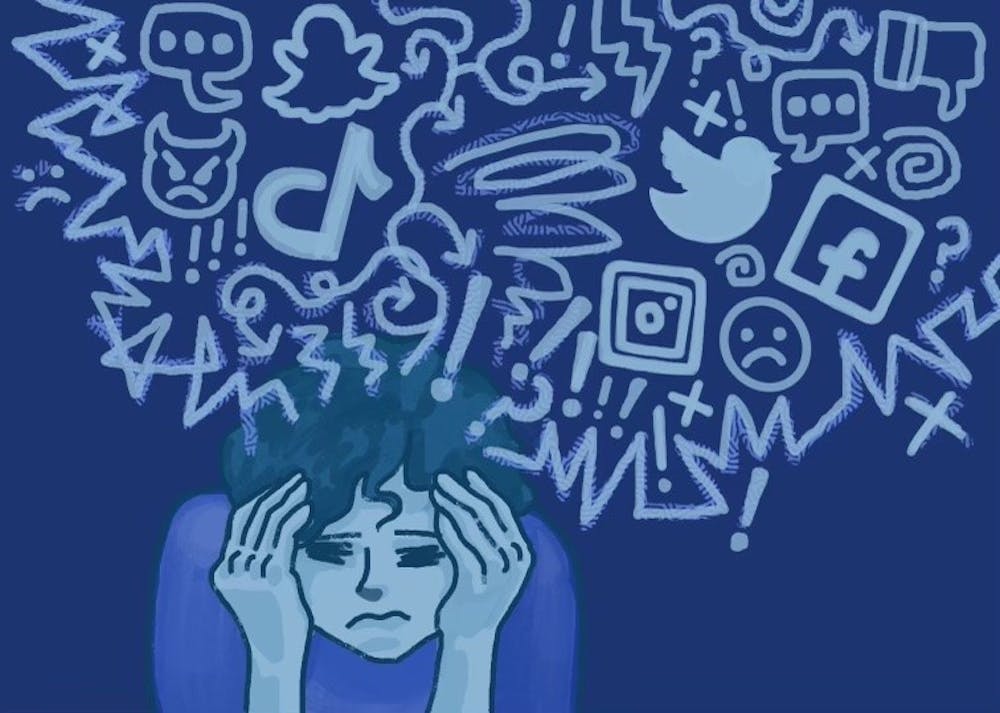The alarm rings at 8 a.m. I see the to-do list I have written out on a piece of paper on my desk. Class does not start until later in the afternoon, and I have the whole morning to finish homework, apply for internships and plan my thesis.
This is the time where I am the most productive, when I feel like I am on top of the world.
Instead, I hit the snooze button and sleep for another half hour. I procrastinate on the tasks I originally planned on completing. Instead of going to the library for an hour to study, I spend twice that time scrolling through Instagram.
At the end of 2021, my daily average screen time was nearly eight hours. On paper, there is nothing inherently wrong about that. I could have been reading the news or messaging a close friend.
The problem is over 50% of that screen time was spent on social media. Instagram, Snapchat, Facebook. You name it, I was on it.
But again, is that really a bad thing?
When I walk around campus and look around, I see the exact same phenomenon. Students' eyes are glued to their phones, liking every picture that appears on their Instagram feed and sending snaps to their friends every other minute.
I've seen countless articles that all decry social media. While they may have caught my attention, those headlines were not enough to pierce through my phone screen and hit the delete button on those apps.
It was not until last semester that I started reflecting on just how addictive social media can be.
During class, I wouldn't pay attention to the professor. I would instead be looking at what J. Cole just posted to promote his new album. Rather than focus on getting my work done in the Hayden Library, I would send photos to my friends giving them a tour of the facility.
These activities, in isolation and in moderation, may not be issues. It was when they became recurring, daily habits that it started to hurt me academically. The more time I spent on social media, the less I was being productive in my school work — and my grades started to reflect that.
Beyond just academics, it started to get in the way of my other interests.
Instead of tracking my weights between lifting sets, I would scroll through the pages of other fitness influencers, telling myself I was looking for motivation.
Rather than binge watch "The Falcon and The Winter Soldier," I was binge watching Instagram stories.
This culminated in seeing that screen time report at the end of year. The article headlines, the ones that failed to have me reconsider my social media habits, started to become the center of my thoughts.
When I first deleted the apps off my phone, it felt like a significant part of my life was just ripped away. That was when I realized just how big of a problem my attachment to social media had become.
I spent the first couple of days telling myself to re-download the apps.
How else would I keep in touch with your friends?
What would I do in my free time?
The fact that I had to ask those questions made me realize how deleting these apps put me on the right track.
Now I could finally put those hours into my schoolwork at Hayden Library, instead of toward Instagram. Instead of taking random photos on Snapchat to send to my friends, I could finally appreciate photography as an art form.
Beyond the productiveness side of things, my mind felt simply decompressed.
No longer did I have this slew of information being thrown at my mind every second. I stopped comparing myself to the highlight reels people threw online.
This forced me to stop focusing on others and start focusing on myself. It allowed me to stay present and remain in the now. I was not thinking about how much fun others seemed to be having, instead I was thinking about myself and how I could invest my time.
This way, I can interact with my friends face-to-face rather than see them through a screen. These is where the most valuable interactions occur anyway.
Reach the reporter at amimam1@asu.edu and follow @amir_amimam1 on Twitter.
Like The State Press on Facebook and follow @statepress on Twitter.

Amir Imam is a reporter for the Echo, providing a unique lens for The State Press and ASU to view pop culture and media through. His articles have covered major projects being done by professors, news in pop culture, and events relevant to students.




